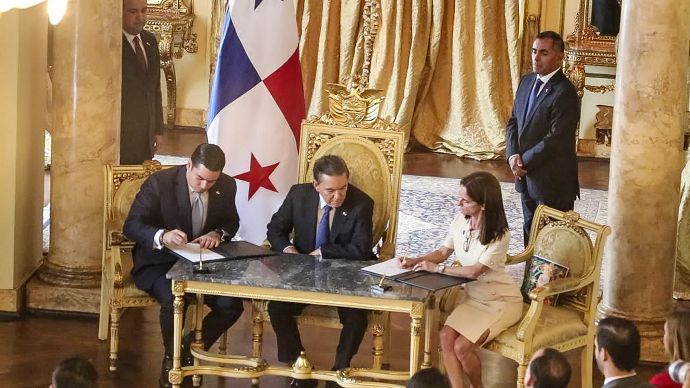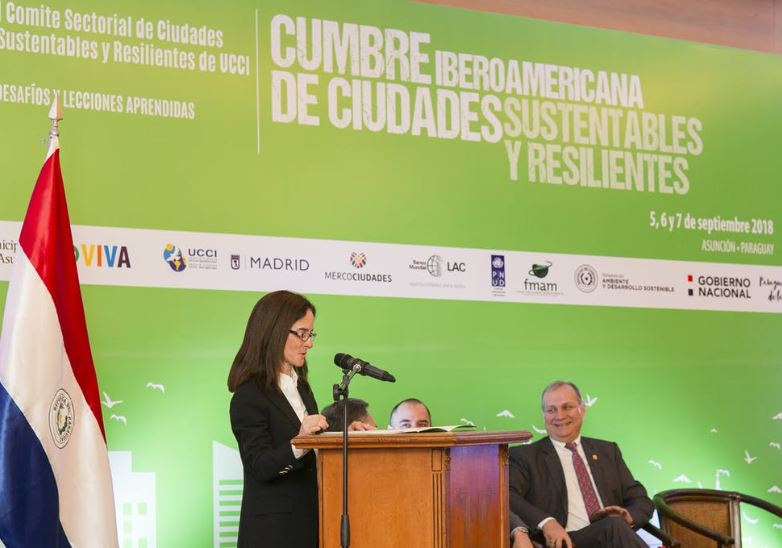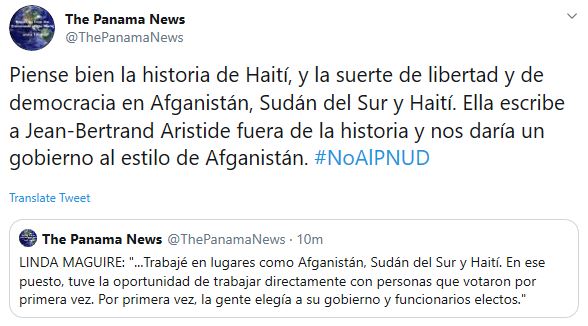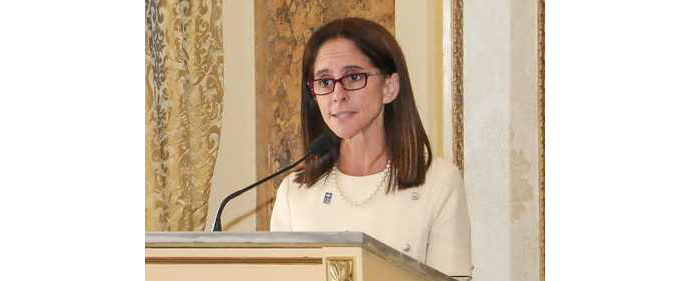Linda Maguire, encargada de la “consultación” constitucional.
Presidente Cortizo Cohen escucha a los panameños y decide
ampliar el Diálogo Nacional sobre las reformas constitucional
por la Presidencia
lunes, 23 de diciembre de 2019
El presidente Laurentino Cortizo Cohen firmó hoy un Memorando de Entendimiento con Linda Maguire, representante residente del Programa de las Naciones Unidas para el Desarrollo (PNUD) con el propósito de diseñar una metodología para facilitar y desarrollar un diálogo entre panameños con el fin de lograr un consenso sobre el contenido de la reforma a la Constitución Política de la República de Panamá.
Como paso uno, el presidente Cortizo Cohen dijo que esta tarde se presentará ante el Consejo de Gabinete una propuesta para consideración de los ministros en la que se lo solicitará a la Asamblea Nacional que retire las reformas Constitucionales que se discute en el pleno legislativo. Luego, vía PNUD, se abriría “un amplio diálogo que incluya otros sectores que sea participativo y ordenado”.
“Solamente el proceso de armar un diálogo toma unos cuatro o cinco meses”, explicó el presidente Cortizo Cohen; y añadió que la idea es que, en el 2021, con el bicentenario de la independencia de Panamá de España estén las reformas que se requieren en los tres órganos del Estado: Ejecutivo, Legislativo y Judicial.
El presidente Cortizo Cohen dijo que “lo que se incluya en esa propuesta, dentro de año, año y medio, al final no divida al país porque hay heridas que pueden cerrarse, pero hay heridas que no cicatrizan, y como presidente de la República, eso no lo voy a permitir, así que busquemos la manera de fortalecer”.
El PNUD se propone acompañar al Ministerio de la Presidencia en “el desarrollo de un proceso de diálogo democrático, participativo e inclusivo, basado en su metodología, que concluya en una propuesta de reformas Constitucionales avalada por la mayoría del pueblo panameño”, dice el acuerdo diplomático.
El Gobierno Nacional solicitó el apoyo al PNUD en busca de garantizar la participación ciudadana y fortalecer los mecanismos democráticos de consulta como facilitador en un diálogo que busca una propuesta consensuada.
Participaron como invitados los expresidentes Ernesto Pérez Balladares, Mireya Moscoso y Martín Torrijos; el presidente de la Asamblea Nacional, Marco Castillero, así como presidentes de partidos políticos, miembros de la sociedad civil, directivos de medios de comunicación social y gremios empresariales.
Maguire dijo que las conversaciones comenzarán por mesas locales, provincias y comarcas, con participaron ampliada para conversar sobre las reformas que hacen falta y luego tener una mesa nacional para agregar todas las contribuciones.
“Nuestro rol es solo de facilitar. No somos mediador, no entramos en el contenido ni en la discusión. Para nosotros la imparcialidad y la soberanía son fundamentales. Para los panameños definir el enfoque del diálogo” con “expertos nacionales porque Panamá tiene todo lo que hace falta en términos de derecho y el contenido de la Constitución”, explicó la representante del PNUD.

at https://www.iknowpolitics.org/en/discuss/expert-or-team-member/linda-maguire
Linda Maguire
Ms. Maguire is the Chief of Country Support for Eastern and Southern Africa with UNDP’s Regional Bureau for Africa. She joined UNDP in 1998 and has worked as UNDP’s chief Electoral Advisor in the Democratic Governance Group from 2003 to 2013, and before that in UNDP’s Evaluation Office on results-based performance assessment. In her current position, she provides support to UNDP country offices on programme and operations, across all the areas in which UNDP works.
Before joining UNDP, she was a Senior Program Officer for West Africa with the National Democratic Institute, where she managed the electoral assistance programs in Côte d’Ivoire and Mali, as well as provided support to legislatures, political parties and civil-society initiatives in the region.
Ms. Maguire holds a Master of Arts from the Fletcher School of Law and Diplomacy, Tufts University. She is the author of “Power Ethnicized: The Pursuit of Protection and Participation in Rwanda and Burundi”, Vol. 2 Buffalo Journal of International Law, and author of/contributor to a number of UNDP publications on democratic governance, including the recent UNDP’s Handbook on Working with Political Parties.

De LinkedIn
Linda Maguire
UNDP Resident Representative in Panama at UNDP
Fletcher School of Law and Diplomacy
Experiencia
UNDP Resident Representative in Panama
UNDP
feb. de 2019 – Actualidad11 meses
Panama City, Panama
UN Resident Coordinator/UNDP Resident Representative in Paraguay
United Nations
mar. de 2018 – feb. de 20191 año
Asuncion, Paraguay
UNDP
19 años 6 meses
Chief of Country Support
mar. de 2013 – mar. de 20185 años 1 mes
Regional Bureau for Africa
Electoral Advisor
ago. de 2003 – mar. de 20139 años 8 meses
HQ and UNDP Mexico
Evaluation Specialist
abr. de 2001 – ago. de 20032 años 5 meses
Governance Specialist
oct. de 1998 – abr. de 20012 años 7 meses
Senior Programme Officer
National Democratic Institute (NDI)
jun. de 1995 – sept. de 1998
3 años 4 meses
DC, Cote d’Ivoire, Mali
Paralegal
New York County District Attorney’s Office
sept. de 1991 – ago. De 1993
2 años
Greater New York City Area
Paralegal in the Appeals Bureau
[Editor’s note: The above two jobs, formally nonpartisan, were with Democratic Party aligned officials or organizations and suggest that she’s a Democrat.]
Fletcher School of Law and Diplomacy
Fletcher School of Law and Diplomacy
MALD International Law and Legal Studies
1993 – 1995
Tufts University
Tufts University
Bachelor of Arts (B.A.) International Relations and Affairs
1987 – 1991
Idiomas
French
Spanish
De la página de web del PNUD
“Linda Maguire, de nacionalidad estadounidense e irlandesa…
“…se repasaron los logros nacionales en materia de desarrollo humano, resultado de la aplicación de mecanismos de cooperación internacional y el intercambio de buenas prácticas con el apoyo de PNUD. …

From the UNDP website:
“Linda Maguire, de nacionalidad estadounidense e irlandesa…
“…se repasaron los logros nacionales en materia de desarrollo humano, resultado de la aplicación de mecanismos de cooperación internacional y el intercambio de buenas prácticas con el apoyo de PNUD. …
– –
at https://unfoundation.org/blog/post/americans-in-the-un-election-assistance-around-the-world/
As part of our “Americans in the UN” project to share the stories of Americans who work for the United Nations, we connected with Linda Maguire, who currently serves as the Resident Representative in Panama for the UN Development Programme (UNDP).
In this role, Maguire leads the work of the UN’s main development agency in Panama, which collaborates with national partners to fight poverty, promote good governance, protect the environment, foster resilience to shocks, and promote gender equality. At the time this interview was conducted, Maguire was the UN Resident Coordinator and UNDP Resident Representative in Paraguay.
Originally from Hollis, New Hampshire, she earned a Bachelor’s degree in International Relations from Tufts University.
From your experience, what is an example of how the UN has made a different in someone’s life?
Linda Maguire: I had the fortune of working in technical assistance for elections for 10 years where I worked in places like Afghanistan, South Sudan, and Haiti. In that role, I had the opportunity of working directly with people who were voting for the first time. For the first time, people were choosing their government and elected officials.
Elections are not the be all, end all of democracy, but they are necessary. Necessary, but not sufficient. The credibility that comes from UN technical assistance to hold credible, peaceful elections really does make a difference in peoples’ lives.
What motivates you to work for the UN?
LM: The fact that you’re helping people. That’s a very basic motivation, but more than that, I would say that the UN strikes a very good balance between idealism and pragmatism.
The Charter of the UN and the UN Declaration of Human Rights are based on human rights principles fundamental to every human being’s well-being and ability to lead a life with dignity. At the same time, the UN was born out of World War II and recognizes politics and that member states have political interests.
The organization does try to balance its ideals with real politics at the same time. I think, for that, it has stood the test of time and it has managed to stay relevant since World War II.
How did you first learn about the UN?
LM: My first direct experience with the UN was when I went to Geneva to work with the human rights machinery when I was studying in graduate school at The Fletcher School of Law and Diplomacy (Tufts). It was a very intellectual connection to the UN because I was working on human rights resolutions and statutes.
Later on, I interacted with the UN when I was working for an American nongovernmental organization in Africa. In that role, my interactions with the UN were more as an outsider looking in and seeing how the UN played a role in peace and security, in development, and in human rights at country level.
[SAY WHAT?!?!? The National Democratic Institute is a congressionally funded international program, unoffically but nevertheless as a matter of reality a project of the Democratic Party. One of those governmental NGOs notwithstanding all denials. As in, during the latter part of the Bill Clinton administration she was a Democratic apparatchik in Africa. See https://en.wikipedia.org/wiki/National_Democratic_Institute .]
Eventually, I came to work directly with the UN in the late 1990s, and so my experience has now been from inside the organization.
What is your message to Americans about the importance of the UN?
LM: I would say fundamentally three key messages. The first would be that it’s our organization. The United States was a pivotal actor behind the creation of the United Nations, and I think it’s very important that we take ownership of the organization and understand what it is about.
I’m often asked when I’m in the United States whether I am a translator because that is sometimes the only thing Americans can associate with the UN – the big meetings of the Security Council or General Assembly that are held in New York, which require a lot of translation.
The second is to inform ourselves. Perhaps the UN could do a better job of communicating its mandate, but what we see sometimes is only the tip of the iceberg.
The United Nations is working in peace and development, and the Security Council is of course important, but the UN is also working in human rights, humanitarian assistance, and development in around 170 countries. That is where the real work is taking place with national governments and partners to lift people out of poverty. So, I would say educate ourselves about what the UN does beyond New York.
The third is that the UN is not only the right thing to do, but it’s also the smart thing to do. The UN is an ideals-based organization working to ensure that people have the chance to live their lives in peace and security, free of fear, free of hunger, free of want. If the UN can achieve these goals, countries around the world will have access to the same kinds of education, health, and justice – benefits that we’re lucky enough to enjoy in the United States.
What is your favorite part of your job?
LM: My favorite part of my job is the diversity. Working in Paraguay, the panorama and the range of things that I did day in and day out varied considerably.
It was impossible to get bored because one day I would be out in the field talking with local communities about their needs, and the next day I may be talking with the president of the country at a very strategic policy level, and everything in between.
So, the bandwidth of the job is incredible, and I feel very lucky to be able to work at the country level day in and day out with people who are committed to making Paraguay a better place.








